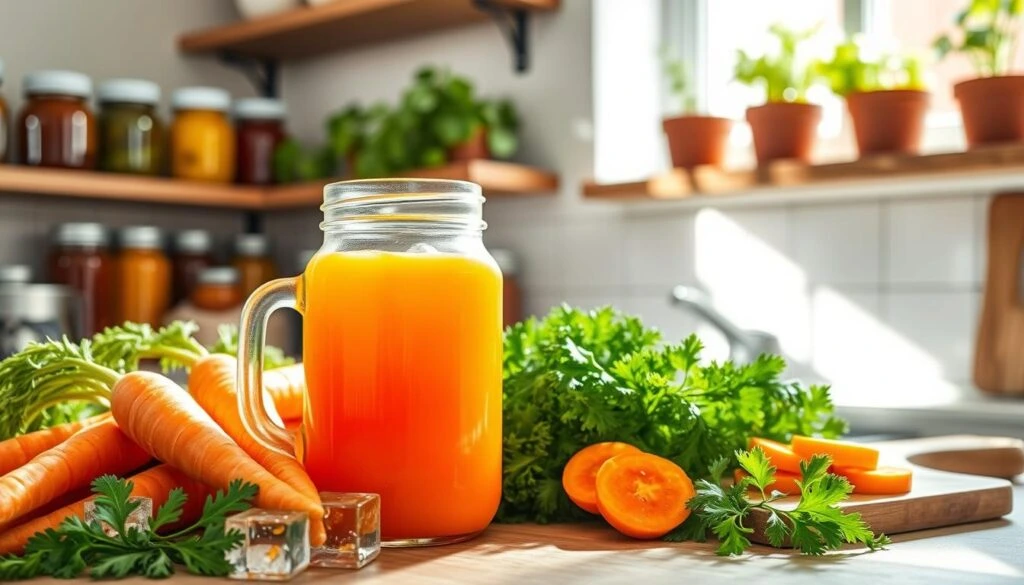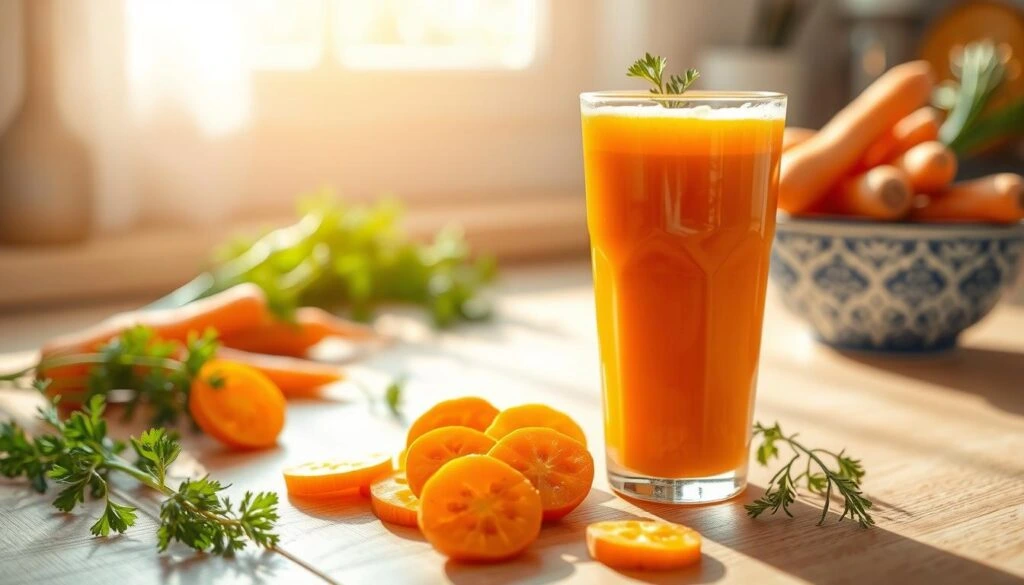Do you remember the first time you tasted fresh carrot juice? It was sweet, vibrant orange, and had a crisp aroma. This experience connects us to nature’s gifts. Today, we’re exploring homemade carrot juice, a simple yet powerful drink that can change your day.
Making your own carrot drink is more than just following steps. It’s about finding wellness in your busy life. As you wash the carrots and hear your juicer, you’re not just making a drink. You’re investing in your health and enjoying the essence of fresh veggies.
Let’s start this juicing adventure together. We’ll see how easy it is to add healthy juicing to your life. Whether you’re a pro or new to juicing, this guide will encourage you to make your own carrot juice and enjoy its health benefits.
Table of Contents
A Brief History of Carrots: From Iran to Your Glass
Carrots have a long history, over a thousand years old. They started in ancient Persia, now Iran. These veggies have traveled far from their roots to become loved worldwide.
Ancient Origins in Persia
The first carrots were grown 1,200 years ago in Iran. Back then, they were not orange like today. They were purple, white, and yellow too.
Global Cultivation Journey
Carrots spread to the world as traders and explorers moved. They took carrot seeds with them. This led to many types of carrots for different places and tastes.
Modern Carrot Production
Now, carrots are grown all over the world. There are over 500 types grown globally. In the U.S., Danvers and Imperator are favorites. Other places have their own favorites too:
- Canada and Australia: Nantes
- Africa and Asia: Kuroda
- Europe: Chantenay
Orange carrots are common, but you can find purple, white, red, and yellow ones too. Every hue offers unique health advantages and tastes. Carrots are great for your diet.
| Carrot Color | Nutritional Highlight | Common Varieties |
|---|---|---|
| Orange | High in beta-carotene | Danvers, Imperator |
| Purple | Rich in anthocyanins | Purple Haze, Cosmic Purple |
| White | Low in pigments | White Satin, Snow White |
| Yellow | Contains xanthophylls | Solar Yellow, Yellowstone |
Essential Health Benefits of Carrot Juice
Carrot juice is a nutrient-rich drink that can improve your health. It’s full of vitamins, minerals, and antioxidants. These elements make carrot juice a great choice for your diet.
Vitamin and Mineral Content
Carrot juice is packed with vitamins and minerals. These nutrients are essential for your body’s functions. Here’s what you get from one cup of carrot juice:
- 428% of the daily value for Vitamin A
- 13% of the daily value for Vitamin C
- 12% of the daily value for Potassium
- 4% of the daily value for Calcium
- 3% of the daily value for Iron
Antioxidant Properties
Carrots have antioxidants that protect your body. Beta-carotene, lutein, and zeaxanthin are key. They fight off free radicals and support your health.
Eye Health Support
Carrot juice is good for your eyes. It has lots of vitamin A, thanks to beta-carotene. This helps keep your vision sharp and may prevent eye diseases.
Immune System Benefits
Carrot juice boosts your immune system. It’s full of vitamin C, which helps your body fight off infections. The vitamins and antioxidants in carrot juice support your immune health.
| Nutrient | Amount per Cup (236 ml) | % Daily Value |
|---|---|---|
| Calories | 94 | 5% |
| Carbohydrates | 21g | 7% |
| Fiber | 2g | 8% |
| Protein | 2g | 4% |
| Fat | 0.5g | 1% |
Required Equipment and Ingredients
Making tasty carrot juice at home is easy with the right tools and ingredients. You’ll need a good juicer for carrots or a strong blender. If you’re using a blender, remember to get a fine-mesh strainer for the pulp.
For your juice, you’ll need 5 large, fresh carrots. Organic carrots are best, but regular ones work too. You can also add 2 navel oranges and a small piece of ginger for extra taste.
Having a sharp knife and a cutting board for prep is helpful. Prior to juicing, always thoroughly wash your fruits and vegetables. The juicer you pick can change how your juice tastes and looks, so choose one that suits you.
| Equipment | Ingredients | Optional Add-ins |
|---|---|---|
| Juicer or blender | 5 large carrots | 2 navel oranges |
| Fine-mesh strainer (if using blender) | Water (if needed) | 1 thumb-sized piece of ginger |
| Knife and cutting board | Ice cubes (optional) | Lemon for extra vitamin C |
This recipe makes about 1 liter (4 cups) of juice, enough for 4 people. Each serving has about 74 calories, 18g of carbs, 2g of protein, and 0.3g of fat. With these ingredients and tools, you’re ready to make a healthy and tasty drink.
Carrot Drink Recipe Juice: Step-by-Step Guide
Ready to learn how to make carrot juice? This simple recipe will have you enjoying a healthy drink in no time. Let’s explore the steps to juice carrots and make a tasty beverage.
Preparation Steps
Begin by washing and peeling your carrots. You’ll need 4-5 medium carrots for a 10oz serving. Cut them into small pieces for easier juicing. Add an orange and a small piece of ginger for extra flavor and nutrients.
Juicing Process
You can juice carrots with a juicer or blender. If using a juicer, just feed the carrot pieces into it. For a blender, blend the carrots with a bit of water until smooth. This makes it easy to make your carrot drink, no matter your equipment.
Straining and Serving
If blending, strain the mix through a fine mesh or cheesecloth to remove pulp. Press the pulp to get as much juice as you can. You can use the leftover pulp in recipes like carrot cake or pudding. Serve your juice fresh or chill it before drinking. Homemade carrot juice stays good for 3-5 days in the fridge.
| Nutrient | Amount per 10oz serving | % Daily Value |
|---|---|---|
| Calories | 250 kcal | 12.5% |
| Carbohydrates | 60g | 20% |
| Vitamin A | 76,072 IU | 1521% |
| Vitamin C | 97mg | 108% |
| Potassium | 1703mg | 36% |
This juice is packed with nutrients. Enjoy it 3-4 times a week for a health boost. But don’t drink too much to avoid carotenemia from beta-carotene.
Flavor Enhancement Options
Carrot juice flavors can be transformed with various additions. You can make exciting carrot juice combinations that taste great and are nutritious. Let’s explore some popular ways to enhance your carrot juice.
Citrus Additions
Adding citrus fruits to your carrot juice can brighten its flavor. Orange is a classic choice, offering a sweet-tart taste that complements carrots well. Lemon adds a zesty kick and helps preserve the juice’s vibrant color. Try this highly-rated recipe:
- Carrot Orange Juice with Apple, Turmeric, and Lemon (5/5 rating from 1274 reviews)
Sweetener Choices
For those looking to enhance sweetness without losing health benefits, consider natural sweeteners. Apples are a great choice, adding natural sugars and fiber. If you prefer, a touch of honey can provide sweetness and antibacterial properties. Here’s a popular recipe:
- Morning Glory Detox Juice: Ready in 10 minutes, vegan-friendly, and only 31 calories per serving
Spice Integration
Spices can add depth and complexity to your carrot juice flavors. Ginger is a popular choice, offering a spicy kick and potential digestive benefits. Turmeric, with its anti-inflammatory properties, is another excellent addition. Try these highly-rated spiced carrot juice combinations:
- Carrot Juice with Turmeric, Orange, and Lemon (5/5 rating from 1274 reviews)
- Fennel Juice with Orange and Cayenne Pepper (5/5 rating from 1206 reviews)
| Juice Combination | Rating | Number of Reviews |
|---|---|---|
| Carrot Orange Juice with Apple, Turmeric, and Lemon | 5/5 | 1274 |
| Carrot Juice with Turmeric, Orange, and Lemon | 5/5 | 1274 |
| Fennel Juice with Orange and Cayenne Pepper | 5/5 | 1206 |
| Beetroot Juice with Strawberries, Orange, and Ginger | 5/5 | 1197 |
Remember, while experimenting with carrot juice flavors can be fun and delicious, consume in moderation. Excessive carrot consumption can lead to carotenemia, a condition that turns the skin orange. Enjoy your enhanced carrot juice as part of a balanced diet!
Storage and Freshness Tips

Fresh carrot juice is best when you drink it right away. If you can’t, storing it properly is crucial. This helps keep its quality and nutrients. Here are some tips for storing carrot juice and making it last longer.
To keep your juice fresh, pour it into a clean, airtight glass container. Glass is better than plastic because it doesn’t take on flavors or smells. Put the container in the back of your fridge, where it’s coolest. Don’t store it in the door, as the temperature there changes a lot.
Carrot juice doesn’t last long. For the best taste and nutrients, drink it within 24 hours. If you must, you can keep it for up to 48 hours. But, the quality will start to go down after the first day.
- Use clean utensils and containers when handling the juice
- To reduce the amount of air exposed, fill the container completely.
- Shake well before drinking, as separation may occur
Remember, fresh carrot juice is best enjoyed right away. These storage tips can help, but they can’t stop all nutrient loss over time. For the best taste and health benefits, make only what you can drink in one sitting.
Nutritional Profile and Daily Values
Carrot juice is full of health benefits. It has 20 to 94 calories per serving, depending on how it’s made. Let’s look at what’s in this colorful drink.
Caloric Content
A 200 ml glass of pure carrot juice has about 20 calories. Adding ingredients like parsley keeps the calories low. It’s great for those watching their weight. Most of these calories come from carbs, with a little from proteins and fats.
Vitamin Breakdown
Carrot juice is known for its vitamins. Here’s what you get:
- Vitamin A: 3800 IU per 100 ml
- Vitamin C: 35.4 mg per 100 ml
- Vitamin E
- Vitamin K
- Niacin
- Biotin
Mineral Content
Carrot juice also has important minerals:
| Mineral | Amount per 100 ml |
|---|---|
| Iron | 0.15 mg |
| Calcium | 8 mg |
| Sodium | 21 mg |
| Potassium | Significant amount |
| Magnesium | Present |
This juice is good for your eyes, immune system, and heart. But, drinking too much can cause vitamin A toxicity. Aim for 4 to 5 ounces a day for the best benefits.
Combining Carrots with Other Ingredients
Carrot juice is tasty alone, but adding other fruits and veggies makes it even better. It’s a chance to try new flavors and get more nutrients. Let’s look at some great pairings to make your carrot juice even more special.
Apple Combinations
Carrot apple juice is a favorite mix. It combines carrots’ earthy taste with apples’ sweet crispness. This blend is not only yummy but also full of good stuff. A glass of carrot apple juice has about 58 calories, 14g of carbs, and 10269IU of Vitamin A.
The apples add extra antioxidants and fiber. It’s a drink that’s both tasty and healthy.
Ginger Infusions
Carrot ginger juice adds a spicy kick. Ginger has been used for nearly 5000 years for its health benefits. It makes the carrot juice taste zesty and adds to its health value.
This mixture helps strengthen your immune system and reduce inflammation. Making carrot ginger juice takes about 15 minutes, making it a quick, healthy choice.
Orange Additions
Orange carrot juice is packed with vitamin C. Each serving of carrots contains roughly 8 milligrams of vitamin C. But adding oranges boosts this amount even more. The orange flavor goes well with carrots, making a refreshing drink.
This sunny mix can be made with a juicer or a high-speed blender. It’s a great way to get more vitamin C and enjoy a tasty drink.
Remember, drink fresh juice right away for the best taste and nutrients. These combinations are a great start for your juicing journey. They let you create healthy, tasty drinks that you’ll love.
Best Times to Drink Carrot Juice

Wondering when to drink carrot juice for the best benefits? The timing matters a lot. Many people like to drink it in the morning or a bit later, around 11 AM to 12 PM.
Drinking it on an empty stomach can help your body absorb nutrients better. After not eating for a while, your body is ready to take in important vitamins and minerals. So, morning is the best time for carrot juice benefits.
Here’s a breakdown of the best times to enjoy your carrot juice:
- Early morning: Kickstart your day with a nutrient boost
- Mid-morning: Provide an energy lift before lunch
- Post-workout: Replenish lost nutrients and aid recovery
Carrot juice is full of nutrients, but don’t overdo it. Stick to about 4 ounces a day to avoid too much beta-carotene. Also, be careful if you have diabetes or blood sugar issues because carrot juice can raise blood sugar levels.
Choosing the right time to drink carrot juice can help you get the most health benefits. It supports your overall well-being.
Common Juicing Mistakes to Avoid
Mastering carrot juicing means avoiding common mistakes. Here are some tips to help you avoid frequent errors and mistakes in carrot juice.
Preparation Errors
One big mistake is not preparing carrots properly. Always wash them well to get rid of dirt and harmful stuff. Don’t overload your juicer, as it can make juice poorly and damage your juicer.
Storage Mistakes
Carrot juice loses its good stuff fast. Try to drink it within 15 minutes. If you can’t, store it in an airtight glass in the fridge for 24-48 hours. Storing it right keeps the juice fresh and stops bacteria from growing.
Consumption Guidelines
Drinking carrot juice is good, but don’t overdo it. Too much can make your skin turn orange. Drink it on an empty stomach or between meals for better absorption. Also, mix it with other veggies to get all the nutrients.
| Juicing Aspect | Recommendation |
|---|---|
| Juice Ratio | 70% vegetables, 30% fruits |
| Best Consumption Time | Within 15 minutes of preparation |
| Storage Duration | 24-48 hours in refrigerator |
Avoiding these mistakes will make your carrot juicing better and healthier.
Seasonal Tips for Selecting Carrots
Choosing carrots for juice is key to getting the best taste and health benefits. Look for firm, bright-colored roots. Stay away from carrots with cracks, splits, or soft spots, as they can ruin your juice.
Smaller carrots are sweeter and softer, making them perfect for juicing. If you can, choose organic carrots to avoid pesticides. Carrots are available all year in the U.S., but they’re at their best from late summer to fall.
Here are some tips for picking the right carrots:
- Check for firmness by gently squeezing the carrot
- Choose carrots with vibrant orange color
- Smaller carrots are typically sweeter
- Avoid carrots with green tops, as they may be bitter
- Select local, seasonal varieties for freshest taste
The quality of your carrots greatly affects your juice’s taste and health. By following these tips, you’ll make delicious and healthy carrot juice at home.
See more: 10 Amazing Carrot Juice Benefits for Your Health and Wellness
Juice Cleanse Recipes For A Powerful Fresh Start
Conclusion
Homemade carrot juice is full of health benefits and easy to make. It’s packed with beta-carotene, which is good for your eyes and immune system. Adding apples or beets makes it even better.
Apples bring vitamins A, K, and C. Beets add nitrates that help your blood vessels. This makes your juice super nutritious.
Use fresh, organic carrots for the best juice. A half-tall cup is full of vitamins and minerals. It only takes 10 minutes to make.
This juice boosts your immune system, helps with digestion, and improves athletic performance. It’s a great addition to your diet.
Drink it in moderation and mix it up with ginger or citrus. This keeps your taste buds happy. Avoid juicing mistakes and store it right for the best flavor and nutrition.
Homemade carrot juice is a simple way to improve your health. Enjoy it every day and celebrate your well-being!
FAQ
How do I make carrot juice at home?
What are the health benefits of carrot juice?
How long can I store carrot juice?
Can I add other ingredients to my carrot juice?
What’s the best time to drink carrot juice?
How many calories are in carrot juice?
What tools are required to prepare carrot juice?
What is the best way to pick carrots for juicing?
Can I drink carrot juice every day?
Which typical blunders should be avoided when preparing carrot juice?
Have You Tried Our Recipe?
There are no reviews yet. Be the first one to write one.

